HLTENN013 Theory Assessment: Nursing Care for the Older Person Diploma
VerifiedAdded on 2020/04/15
|16
|3990
|559
Homework Assignment
AI Summary
This student assignment, completed for the Diploma of Nursing course, focuses on the practical application of care for older persons within the HLTENN013 unit. The assessment addresses various critical aspects of aged care, including the management of patients with conditions such as Alzheimer's disease and diabetes. It explores communication strategies with healthcare professionals, stereotypes associated with aging, and the impact of external factors on older individuals. The assignment delves into the promotion of health maintenance, the application of advocacy skills, and the identification of community resources. Furthermore, it provides a comprehensive overview of elder abuse, including its forms, legal and ethical considerations, and signs. The assessment also examines non-pharmacological therapies for dementia, normal aging processes, and relevant theories. It discusses the care of deceased persons, the grieving process, and the identification of stress signs. Finally, it covers the limitations and legal ramifications of patient restraints. This assignment offers a detailed insight into the multifaceted challenges and responsibilities involved in providing quality care for older adults.
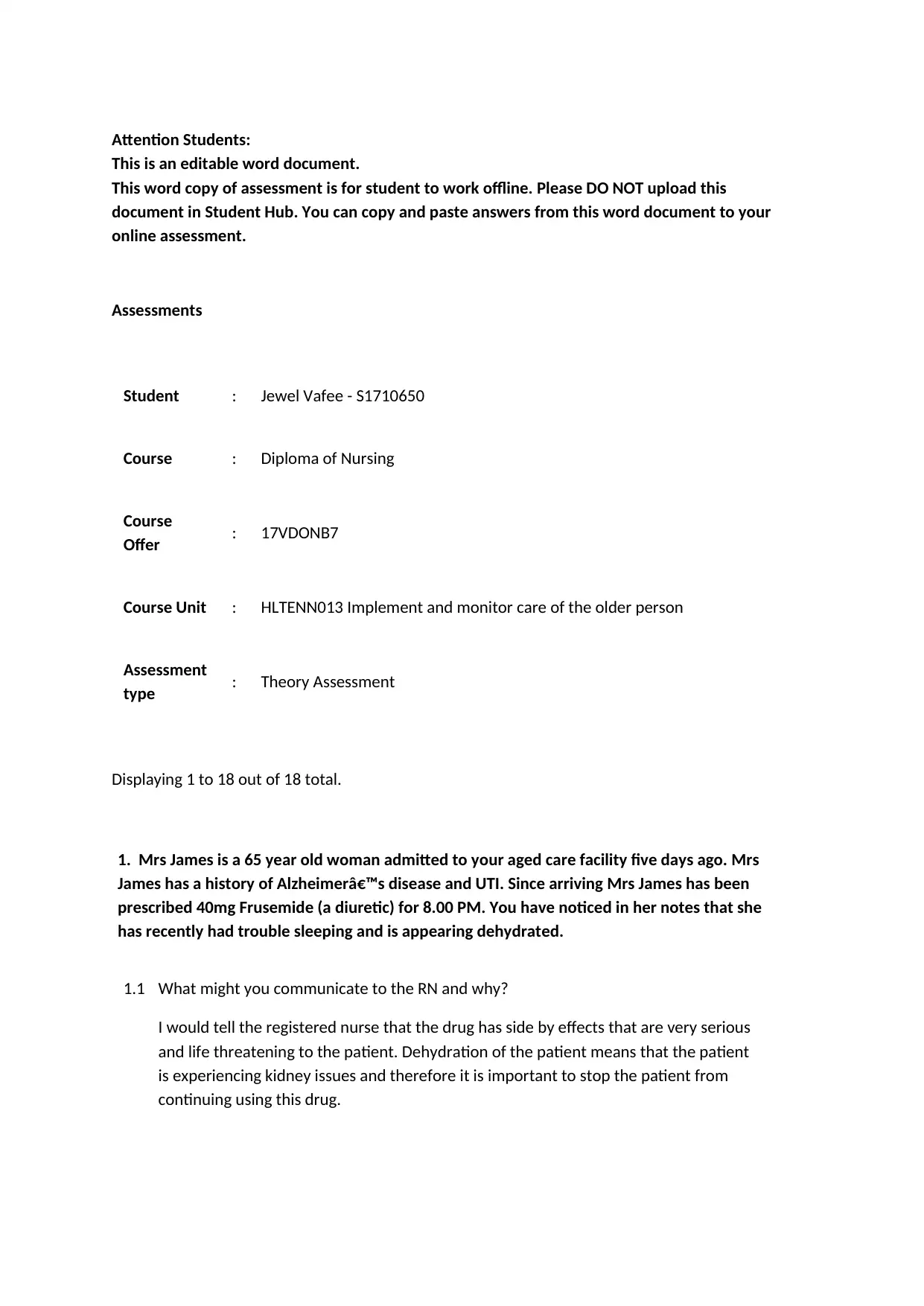
Attention Students:
This is an editable word document.
This word copy of assessment is for student to work offline. Please DO NOT upload this
document in Student Hub. You can copy and paste answers from this word document to your
online assessment.
Assessments
Student : Jewel Vafee - S1710650
Course : Diploma of Nursing
Course
Offer : 17VDONB7
Course Unit : HLTENN013 Implement and monitor care of the older person
Assessment
type : Theory Assessment
Displaying 1 to 18 out of 18 total.
1. Mrs James is a 65 year old woman admitted to your aged care facility five days ago. Mrs
James has a history of Alzheimer’s disease and UTI. Since arriving Mrs James has been
prescribed 40mg Frusemide (a diuretic) for 8.00 PM. You have noticed in her notes that she
has recently had trouble sleeping and is appearing dehydrated.
1.1 What might you communicate to the RN and why?
I would tell the registered nurse that the drug has side by effects that are very serious
and life threatening to the patient. Dehydration of the patient means that the patient
is experiencing kidney issues and therefore it is important to stop the patient from
continuing using this drug.
This is an editable word document.
This word copy of assessment is for student to work offline. Please DO NOT upload this
document in Student Hub. You can copy and paste answers from this word document to your
online assessment.
Assessments
Student : Jewel Vafee - S1710650
Course : Diploma of Nursing
Course
Offer : 17VDONB7
Course Unit : HLTENN013 Implement and monitor care of the older person
Assessment
type : Theory Assessment
Displaying 1 to 18 out of 18 total.
1. Mrs James is a 65 year old woman admitted to your aged care facility five days ago. Mrs
James has a history of Alzheimer’s disease and UTI. Since arriving Mrs James has been
prescribed 40mg Frusemide (a diuretic) for 8.00 PM. You have noticed in her notes that she
has recently had trouble sleeping and is appearing dehydrated.
1.1 What might you communicate to the RN and why?
I would tell the registered nurse that the drug has side by effects that are very serious
and life threatening to the patient. Dehydration of the patient means that the patient
is experiencing kidney issues and therefore it is important to stop the patient from
continuing using this drug.
Paraphrase This Document
Need a fresh take? Get an instant paraphrase of this document with our AI Paraphraser
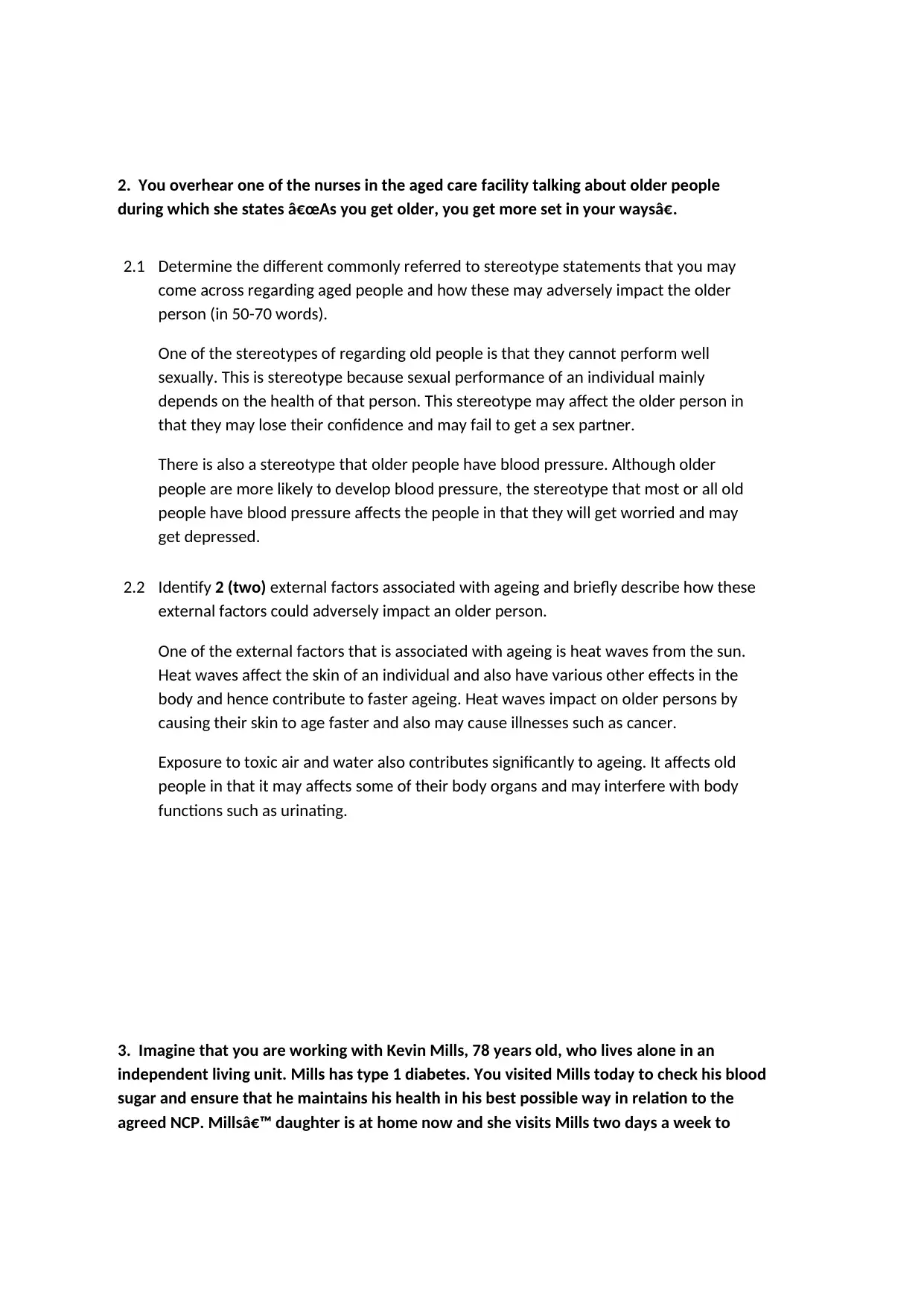
2. You overhear one of the nurses in the aged care facility talking about older people
during which she states “As you get older, you get more set in your ways†.
2.1 Determine the different commonly referred to stereotype statements that you may
come across regarding aged people and how these may adversely impact the older
person (in 50-70 words).
One of the stereotypes of regarding old people is that they cannot perform well
sexually. This is stereotype because sexual performance of an individual mainly
depends on the health of that person. This stereotype may affect the older person in
that they may lose their confidence and may fail to get a sex partner.
There is also a stereotype that older people have blood pressure. Although older
people are more likely to develop blood pressure, the stereotype that most or all old
people have blood pressure affects the people in that they will get worried and may
get depressed.
2.2 Identify 2 (two) external factors associated with ageing and briefly describe how these
external factors could adversely impact an older person.
One of the external factors that is associated with ageing is heat waves from the sun.
Heat waves affect the skin of an individual and also have various other effects in the
body and hence contribute to faster ageing. Heat waves impact on older persons by
causing their skin to age faster and also may cause illnesses such as cancer.
Exposure to toxic air and water also contributes significantly to ageing. It affects old
people in that it may affects some of their body organs and may interfere with body
functions such as urinating.
3. Imagine that you are working with Kevin Mills, 78 years old, who lives alone in an
independent living unit. Mills has type 1 diabetes. You visited Mills today to check his blood
sugar and ensure that he maintains his health in his best possible way in relation to the
agreed NCP. Mills’ daughter is at home now and she visits Mills two days a week to
during which she states “As you get older, you get more set in your ways†.
2.1 Determine the different commonly referred to stereotype statements that you may
come across regarding aged people and how these may adversely impact the older
person (in 50-70 words).
One of the stereotypes of regarding old people is that they cannot perform well
sexually. This is stereotype because sexual performance of an individual mainly
depends on the health of that person. This stereotype may affect the older person in
that they may lose their confidence and may fail to get a sex partner.
There is also a stereotype that older people have blood pressure. Although older
people are more likely to develop blood pressure, the stereotype that most or all old
people have blood pressure affects the people in that they will get worried and may
get depressed.
2.2 Identify 2 (two) external factors associated with ageing and briefly describe how these
external factors could adversely impact an older person.
One of the external factors that is associated with ageing is heat waves from the sun.
Heat waves affect the skin of an individual and also have various other effects in the
body and hence contribute to faster ageing. Heat waves impact on older persons by
causing their skin to age faster and also may cause illnesses such as cancer.
Exposure to toxic air and water also contributes significantly to ageing. It affects old
people in that it may affects some of their body organs and may interfere with body
functions such as urinating.
3. Imagine that you are working with Kevin Mills, 78 years old, who lives alone in an
independent living unit. Mills has type 1 diabetes. You visited Mills today to check his blood
sugar and ensure that he maintains his health in his best possible way in relation to the
agreed NCP. Mills’ daughter is at home now and she visits Mills two days a week to
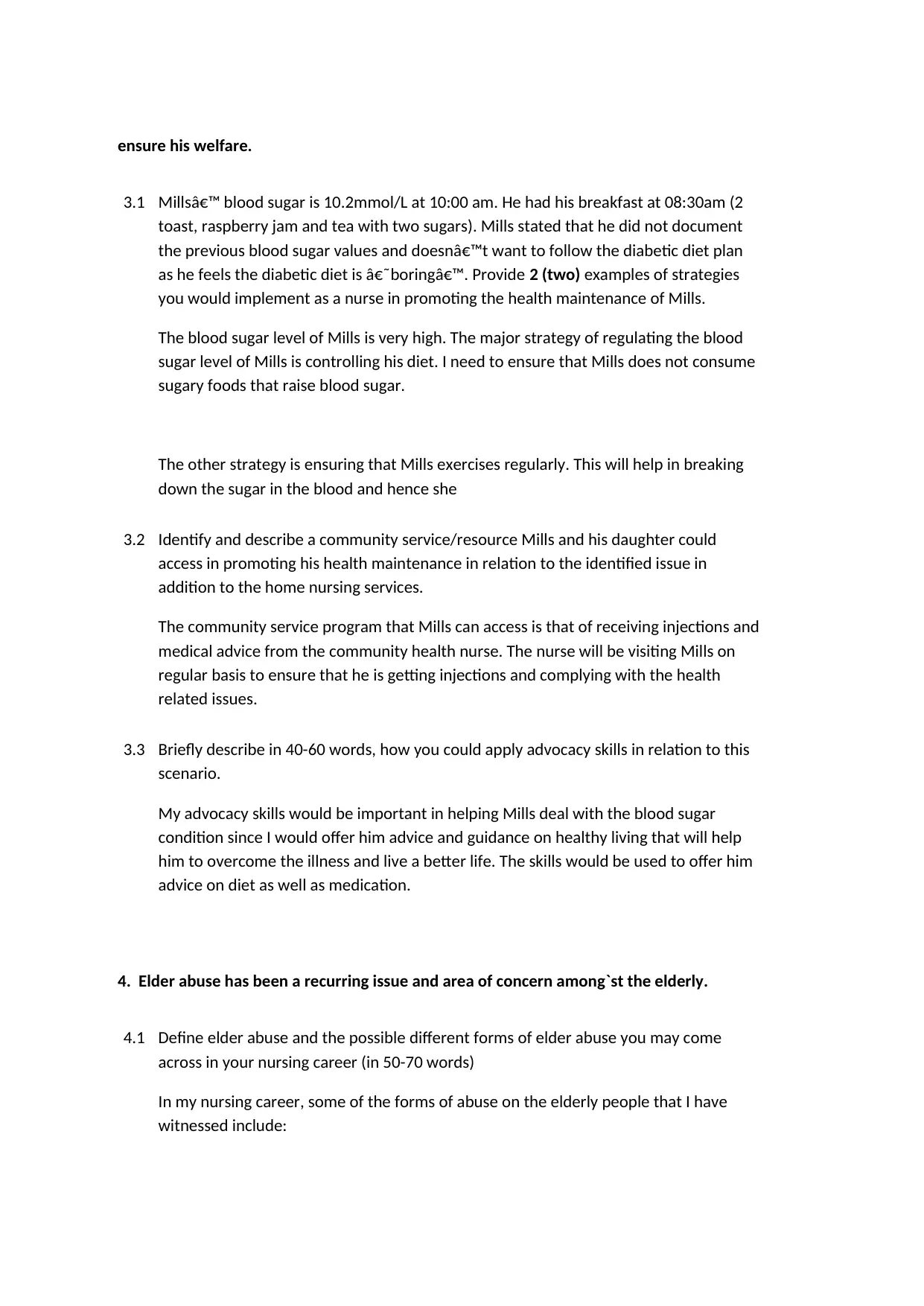
ensure his welfare.
3.1 Mills’ blood sugar is 10.2mmol/L at 10:00 am. He had his breakfast at 08:30am (2
toast, raspberry jam and tea with two sugars). Mills stated that he did not document
the previous blood sugar values and doesn’t want to follow the diabetic diet plan
as he feels the diabetic diet is ‘boring’. Provide 2 (two) examples of strategies
you would implement as a nurse in promoting the health maintenance of Mills.
The blood sugar level of Mills is very high. The major strategy of regulating the blood
sugar level of Mills is controlling his diet. I need to ensure that Mills does not consume
sugary foods that raise blood sugar.
The other strategy is ensuring that Mills exercises regularly. This will help in breaking
down the sugar in the blood and hence she
3.2 Identify and describe a community service/resource Mills and his daughter could
access in promoting his health maintenance in relation to the identified issue in
addition to the home nursing services.
The community service program that Mills can access is that of receiving injections and
medical advice from the community health nurse. The nurse will be visiting Mills on
regular basis to ensure that he is getting injections and complying with the health
related issues.
3.3 Briefly describe in 40-60 words, how you could apply advocacy skills in relation to this
scenario.
My advocacy skills would be important in helping Mills deal with the blood sugar
condition since I would offer him advice and guidance on healthy living that will help
him to overcome the illness and live a better life. The skills would be used to offer him
advice on diet as well as medication.
4. Elder abuse has been a recurring issue and area of concern among`st the elderly.
4.1 Define elder abuse and the possible different forms of elder abuse you may come
across in your nursing career (in 50-70 words)
In my nursing career, some of the forms of abuse on the elderly people that I have
witnessed include:
3.1 Mills’ blood sugar is 10.2mmol/L at 10:00 am. He had his breakfast at 08:30am (2
toast, raspberry jam and tea with two sugars). Mills stated that he did not document
the previous blood sugar values and doesn’t want to follow the diabetic diet plan
as he feels the diabetic diet is ‘boring’. Provide 2 (two) examples of strategies
you would implement as a nurse in promoting the health maintenance of Mills.
The blood sugar level of Mills is very high. The major strategy of regulating the blood
sugar level of Mills is controlling his diet. I need to ensure that Mills does not consume
sugary foods that raise blood sugar.
The other strategy is ensuring that Mills exercises regularly. This will help in breaking
down the sugar in the blood and hence she
3.2 Identify and describe a community service/resource Mills and his daughter could
access in promoting his health maintenance in relation to the identified issue in
addition to the home nursing services.
The community service program that Mills can access is that of receiving injections and
medical advice from the community health nurse. The nurse will be visiting Mills on
regular basis to ensure that he is getting injections and complying with the health
related issues.
3.3 Briefly describe in 40-60 words, how you could apply advocacy skills in relation to this
scenario.
My advocacy skills would be important in helping Mills deal with the blood sugar
condition since I would offer him advice and guidance on healthy living that will help
him to overcome the illness and live a better life. The skills would be used to offer him
advice on diet as well as medication.
4. Elder abuse has been a recurring issue and area of concern among`st the elderly.
4.1 Define elder abuse and the possible different forms of elder abuse you may come
across in your nursing career (in 50-70 words)
In my nursing career, some of the forms of abuse on the elderly people that I have
witnessed include:
⊘ This is a preview!⊘
Do you want full access?
Subscribe today to unlock all pages.

Trusted by 1+ million students worldwide
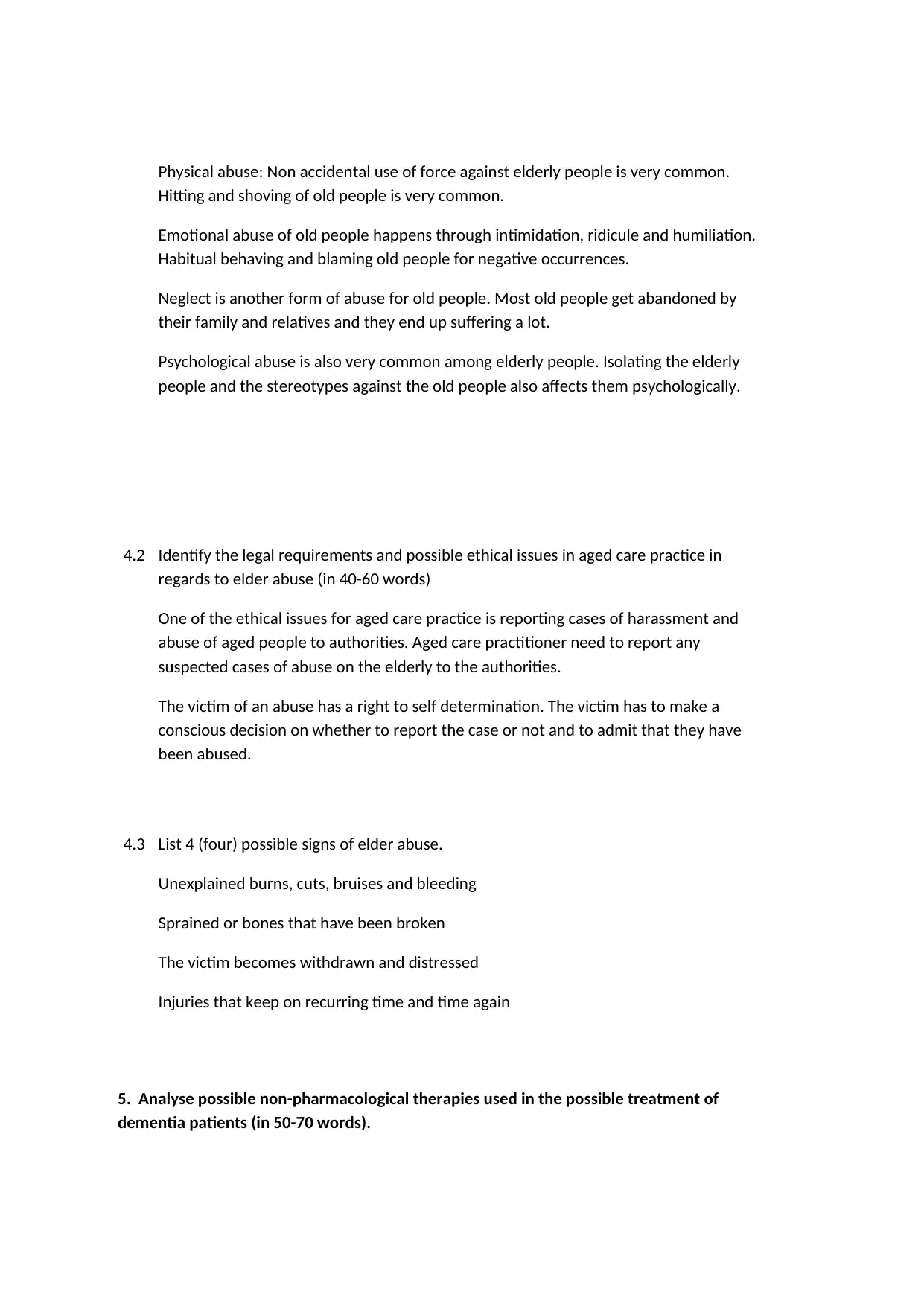
Physical abuse: Non accidental use of force against elderly people is very common.
Hitting and shoving of old people is very common.
Emotional abuse of old people happens through intimidation, ridicule and humiliation.
Habitual behaving and blaming old people for negative occurrences.
Neglect is another form of abuse for old people. Most old people get abandoned by
their family and relatives and they end up suffering a lot.
Psychological abuse is also very common among elderly people. Isolating the elderly
people and the stereotypes against the old people also affects them psychologically.
4.2 Identify the legal requirements and possible ethical issues in aged care practice in
regards to elder abuse (in 40-60 words)
One of the ethical issues for aged care practice is reporting cases of harassment and
abuse of aged people to authorities. Aged care practitioner need to report any
suspected cases of abuse on the elderly to the authorities.
The victim of an abuse has a right to self determination. The victim has to make a
conscious decision on whether to report the case or not and to admit that they have
been abused.
4.3 List 4 (four) possible signs of elder abuse.
Unexplained burns, cuts, bruises and bleeding
Sprained or bones that have been broken
The victim becomes withdrawn and distressed
Injuries that keep on recurring time and time again
5. Analyse possible non-pharmacological therapies used in the possible treatment of
dementia patients (in 50-70 words).
Hitting and shoving of old people is very common.
Emotional abuse of old people happens through intimidation, ridicule and humiliation.
Habitual behaving and blaming old people for negative occurrences.
Neglect is another form of abuse for old people. Most old people get abandoned by
their family and relatives and they end up suffering a lot.
Psychological abuse is also very common among elderly people. Isolating the elderly
people and the stereotypes against the old people also affects them psychologically.
4.2 Identify the legal requirements and possible ethical issues in aged care practice in
regards to elder abuse (in 40-60 words)
One of the ethical issues for aged care practice is reporting cases of harassment and
abuse of aged people to authorities. Aged care practitioner need to report any
suspected cases of abuse on the elderly to the authorities.
The victim of an abuse has a right to self determination. The victim has to make a
conscious decision on whether to report the case or not and to admit that they have
been abused.
4.3 List 4 (four) possible signs of elder abuse.
Unexplained burns, cuts, bruises and bleeding
Sprained or bones that have been broken
The victim becomes withdrawn and distressed
Injuries that keep on recurring time and time again
5. Analyse possible non-pharmacological therapies used in the possible treatment of
dementia patients (in 50-70 words).
Paraphrase This Document
Need a fresh take? Get an instant paraphrase of this document with our AI Paraphraser
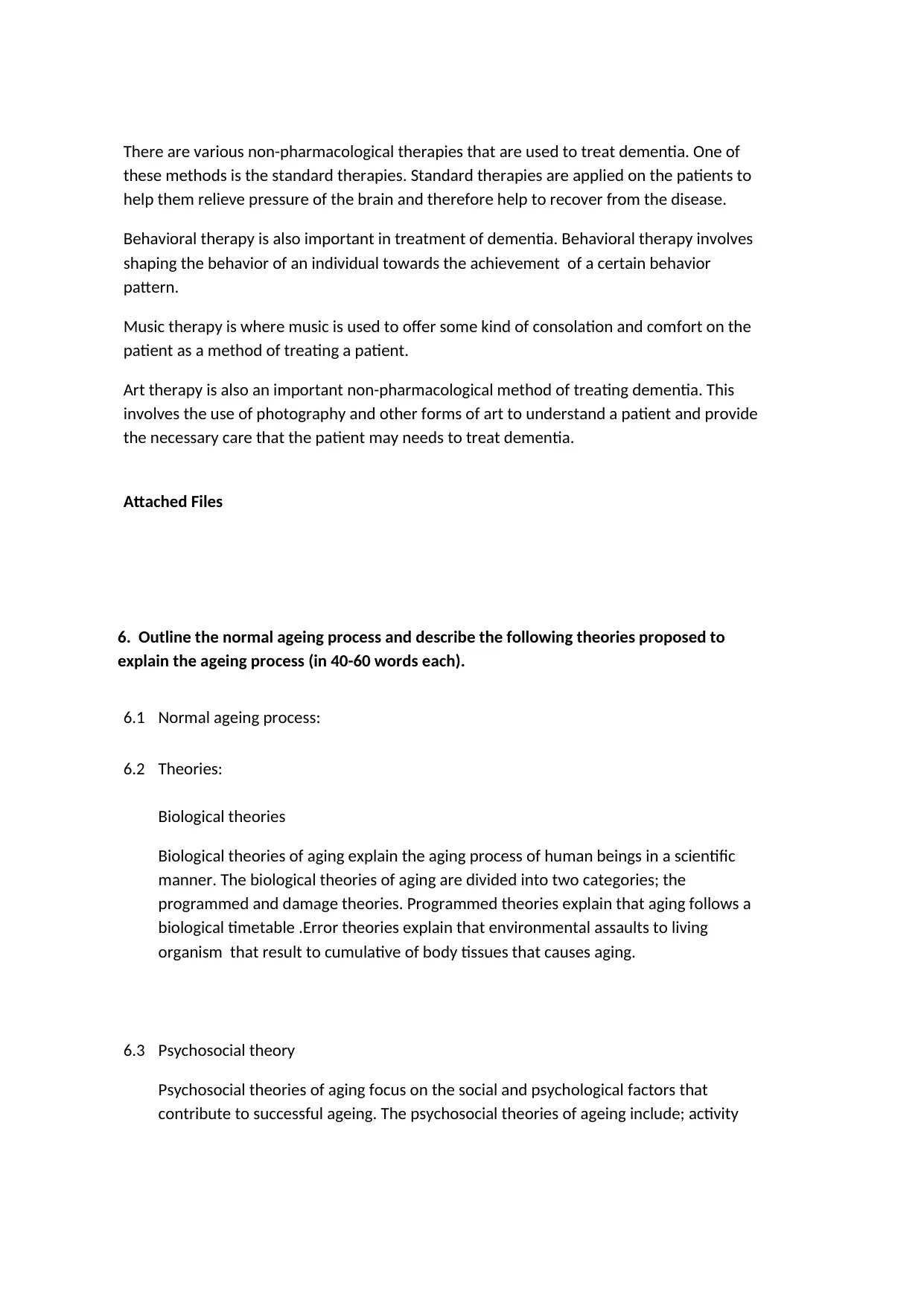
There are various non-pharmacological therapies that are used to treat dementia. One of
these methods is the standard therapies. Standard therapies are applied on the patients to
help them relieve pressure of the brain and therefore help to recover from the disease.
Behavioral therapy is also important in treatment of dementia. Behavioral therapy involves
shaping the behavior of an individual towards the achievement of a certain behavior
pattern.
Music therapy is where music is used to offer some kind of consolation and comfort on the
patient as a method of treating a patient.
Art therapy is also an important non-pharmacological method of treating dementia. This
involves the use of photography and other forms of art to understand a patient and provide
the necessary care that the patient may needs to treat dementia.
Attached Files
6. Outline the normal ageing process and describe the following theories proposed to
explain the ageing process (in 40-60 words each).
6.1 Normal ageing process:
6.2 Theories:
Biological theories
Biological theories of aging explain the aging process of human beings in a scientific
manner. The biological theories of aging are divided into two categories; the
programmed and damage theories. Programmed theories explain that aging follows a
biological timetable .Error theories explain that environmental assaults to living
organism that result to cumulative of body tissues that causes aging.
6.3 Psychosocial theory
Psychosocial theories of aging focus on the social and psychological factors that
contribute to successful ageing. The psychosocial theories of ageing include; activity
these methods is the standard therapies. Standard therapies are applied on the patients to
help them relieve pressure of the brain and therefore help to recover from the disease.
Behavioral therapy is also important in treatment of dementia. Behavioral therapy involves
shaping the behavior of an individual towards the achievement of a certain behavior
pattern.
Music therapy is where music is used to offer some kind of consolation and comfort on the
patient as a method of treating a patient.
Art therapy is also an important non-pharmacological method of treating dementia. This
involves the use of photography and other forms of art to understand a patient and provide
the necessary care that the patient may needs to treat dementia.
Attached Files
6. Outline the normal ageing process and describe the following theories proposed to
explain the ageing process (in 40-60 words each).
6.1 Normal ageing process:
6.2 Theories:
Biological theories
Biological theories of aging explain the aging process of human beings in a scientific
manner. The biological theories of aging are divided into two categories; the
programmed and damage theories. Programmed theories explain that aging follows a
biological timetable .Error theories explain that environmental assaults to living
organism that result to cumulative of body tissues that causes aging.
6.3 Psychosocial theory
Psychosocial theories of aging focus on the social and psychological factors that
contribute to successful ageing. The psychosocial theories of ageing include; activity
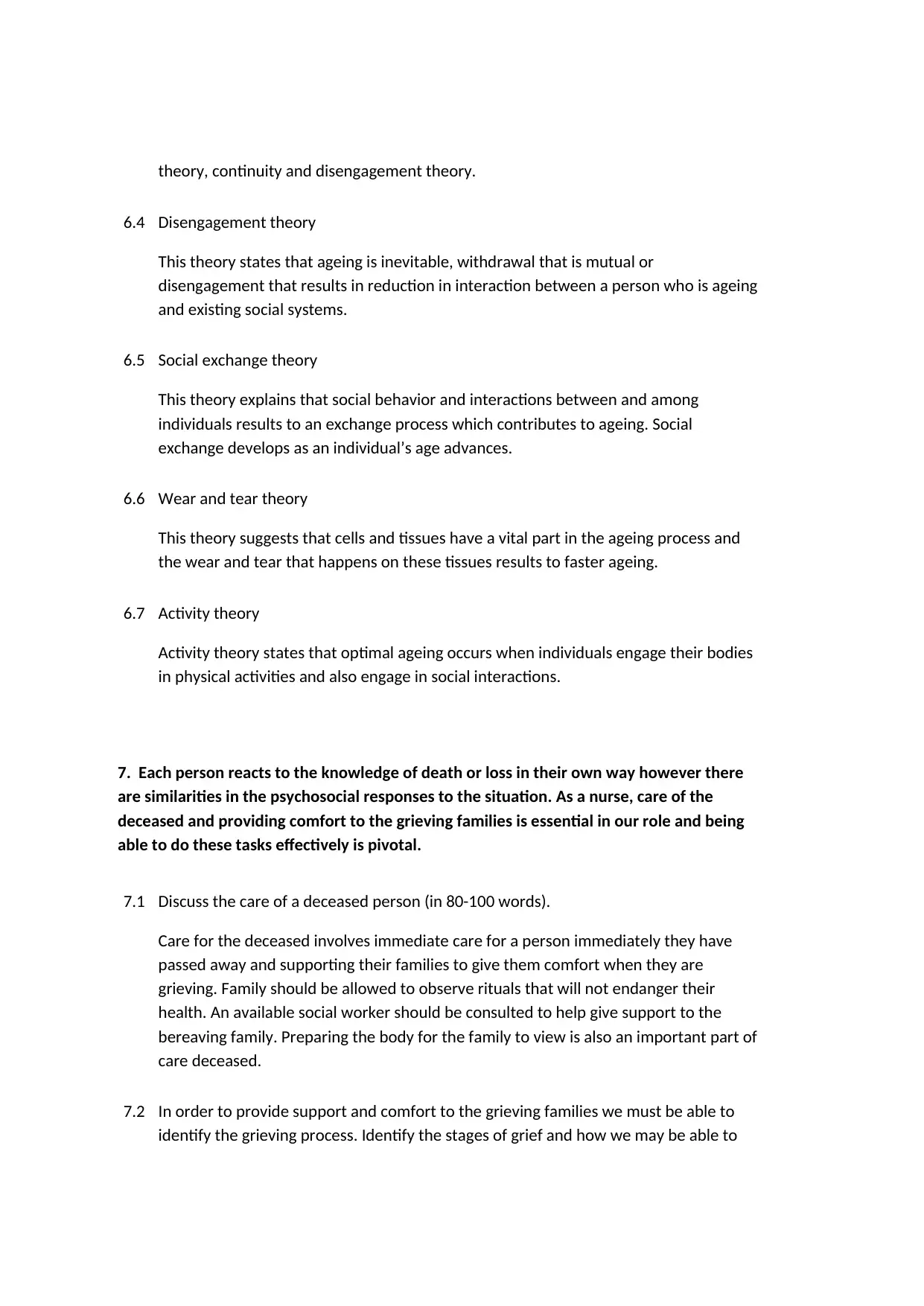
theory, continuity and disengagement theory.
6.4 Disengagement theory
This theory states that ageing is inevitable, withdrawal that is mutual or
disengagement that results in reduction in interaction between a person who is ageing
and existing social systems.
6.5 Social exchange theory
This theory explains that social behavior and interactions between and among
individuals results to an exchange process which contributes to ageing. Social
exchange develops as an individual’s age advances.
6.6 Wear and tear theory
This theory suggests that cells and tissues have a vital part in the ageing process and
the wear and tear that happens on these tissues results to faster ageing.
6.7 Activity theory
Activity theory states that optimal ageing occurs when individuals engage their bodies
in physical activities and also engage in social interactions.
7. Each person reacts to the knowledge of death or loss in their own way however there
are similarities in the psychosocial responses to the situation. As a nurse, care of the
deceased and providing comfort to the grieving families is essential in our role and being
able to do these tasks effectively is pivotal.
7.1 Discuss the care of a deceased person (in 80-100 words).
Care for the deceased involves immediate care for a person immediately they have
passed away and supporting their families to give them comfort when they are
grieving. Family should be allowed to observe rituals that will not endanger their
health. An available social worker should be consulted to help give support to the
bereaving family. Preparing the body for the family to view is also an important part of
care deceased.
7.2 In order to provide support and comfort to the grieving families we must be able to
identify the grieving process. Identify the stages of grief and how we may be able to
6.4 Disengagement theory
This theory states that ageing is inevitable, withdrawal that is mutual or
disengagement that results in reduction in interaction between a person who is ageing
and existing social systems.
6.5 Social exchange theory
This theory explains that social behavior and interactions between and among
individuals results to an exchange process which contributes to ageing. Social
exchange develops as an individual’s age advances.
6.6 Wear and tear theory
This theory suggests that cells and tissues have a vital part in the ageing process and
the wear and tear that happens on these tissues results to faster ageing.
6.7 Activity theory
Activity theory states that optimal ageing occurs when individuals engage their bodies
in physical activities and also engage in social interactions.
7. Each person reacts to the knowledge of death or loss in their own way however there
are similarities in the psychosocial responses to the situation. As a nurse, care of the
deceased and providing comfort to the grieving families is essential in our role and being
able to do these tasks effectively is pivotal.
7.1 Discuss the care of a deceased person (in 80-100 words).
Care for the deceased involves immediate care for a person immediately they have
passed away and supporting their families to give them comfort when they are
grieving. Family should be allowed to observe rituals that will not endanger their
health. An available social worker should be consulted to help give support to the
bereaving family. Preparing the body for the family to view is also an important part of
care deceased.
7.2 In order to provide support and comfort to the grieving families we must be able to
identify the grieving process. Identify the stages of grief and how we may be able to
⊘ This is a preview!⊘
Do you want full access?
Subscribe today to unlock all pages.

Trusted by 1+ million students worldwide
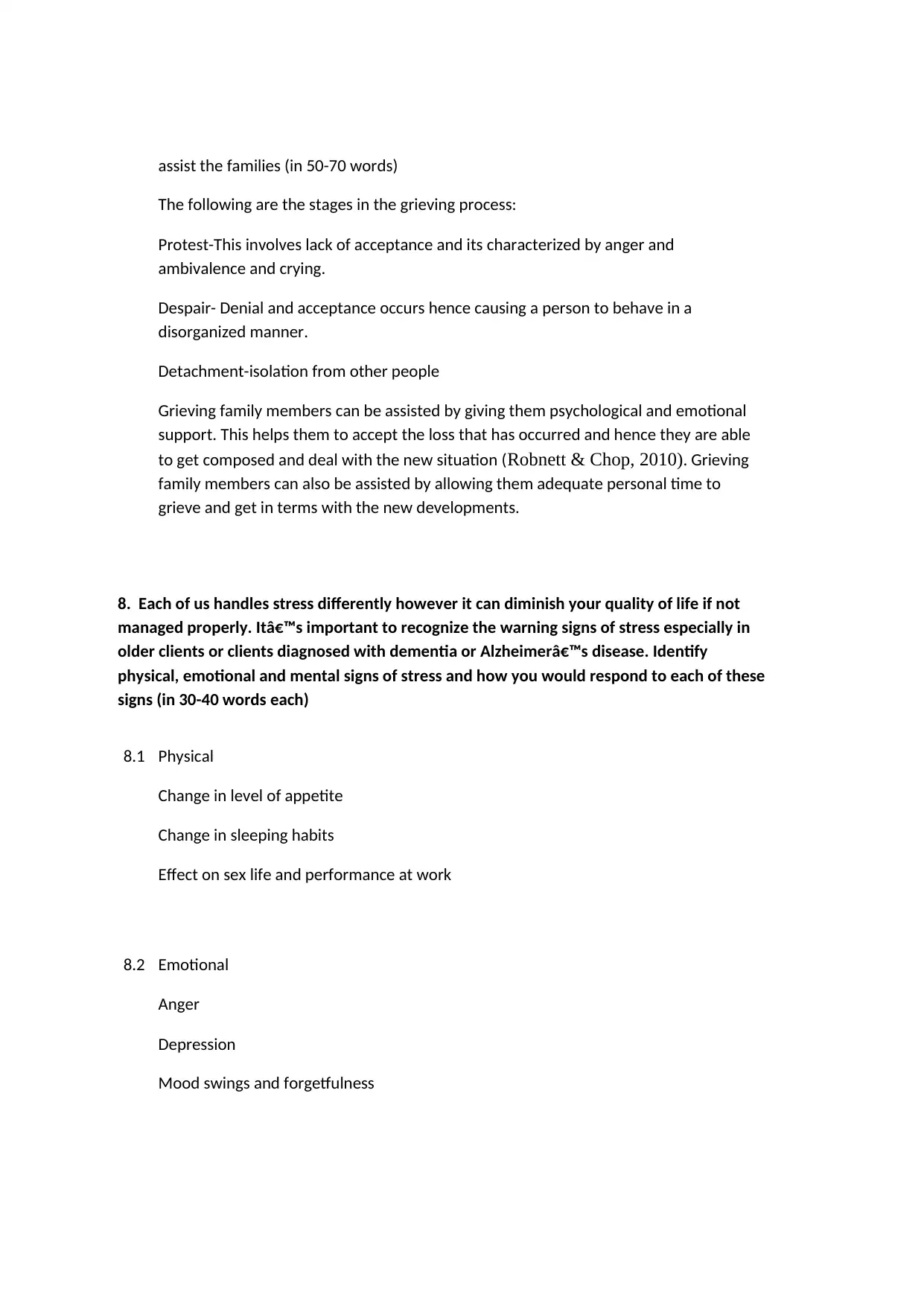
assist the families (in 50-70 words)
The following are the stages in the grieving process:
Protest-This involves lack of acceptance and its characterized by anger and
ambivalence and crying.
Despair- Denial and acceptance occurs hence causing a person to behave in a
disorganized manner.
Detachment-isolation from other people
Grieving family members can be assisted by giving them psychological and emotional
support. This helps them to accept the loss that has occurred and hence they are able
to get composed and deal with the new situation (Robnett & Chop, 2010). Grieving
family members can also be assisted by allowing them adequate personal time to
grieve and get in terms with the new developments.
8. Each of us handles stress differently however it can diminish your quality of life if not
managed properly. It’s important to recognize the warning signs of stress especially in
older clients or clients diagnosed with dementia or Alzheimer’s disease. Identify
physical, emotional and mental signs of stress and how you would respond to each of these
signs (in 30-40 words each)
8.1 Physical
Change in level of appetite
Change in sleeping habits
Effect on sex life and performance at work
8.2 Emotional
Anger
Depression
Mood swings and forgetfulness
The following are the stages in the grieving process:
Protest-This involves lack of acceptance and its characterized by anger and
ambivalence and crying.
Despair- Denial and acceptance occurs hence causing a person to behave in a
disorganized manner.
Detachment-isolation from other people
Grieving family members can be assisted by giving them psychological and emotional
support. This helps them to accept the loss that has occurred and hence they are able
to get composed and deal with the new situation (Robnett & Chop, 2010). Grieving
family members can also be assisted by allowing them adequate personal time to
grieve and get in terms with the new developments.
8. Each of us handles stress differently however it can diminish your quality of life if not
managed properly. It’s important to recognize the warning signs of stress especially in
older clients or clients diagnosed with dementia or Alzheimer’s disease. Identify
physical, emotional and mental signs of stress and how you would respond to each of these
signs (in 30-40 words each)
8.1 Physical
Change in level of appetite
Change in sleeping habits
Effect on sex life and performance at work
8.2 Emotional
Anger
Depression
Mood swings and forgetfulness
Paraphrase This Document
Need a fresh take? Get an instant paraphrase of this document with our AI Paraphraser
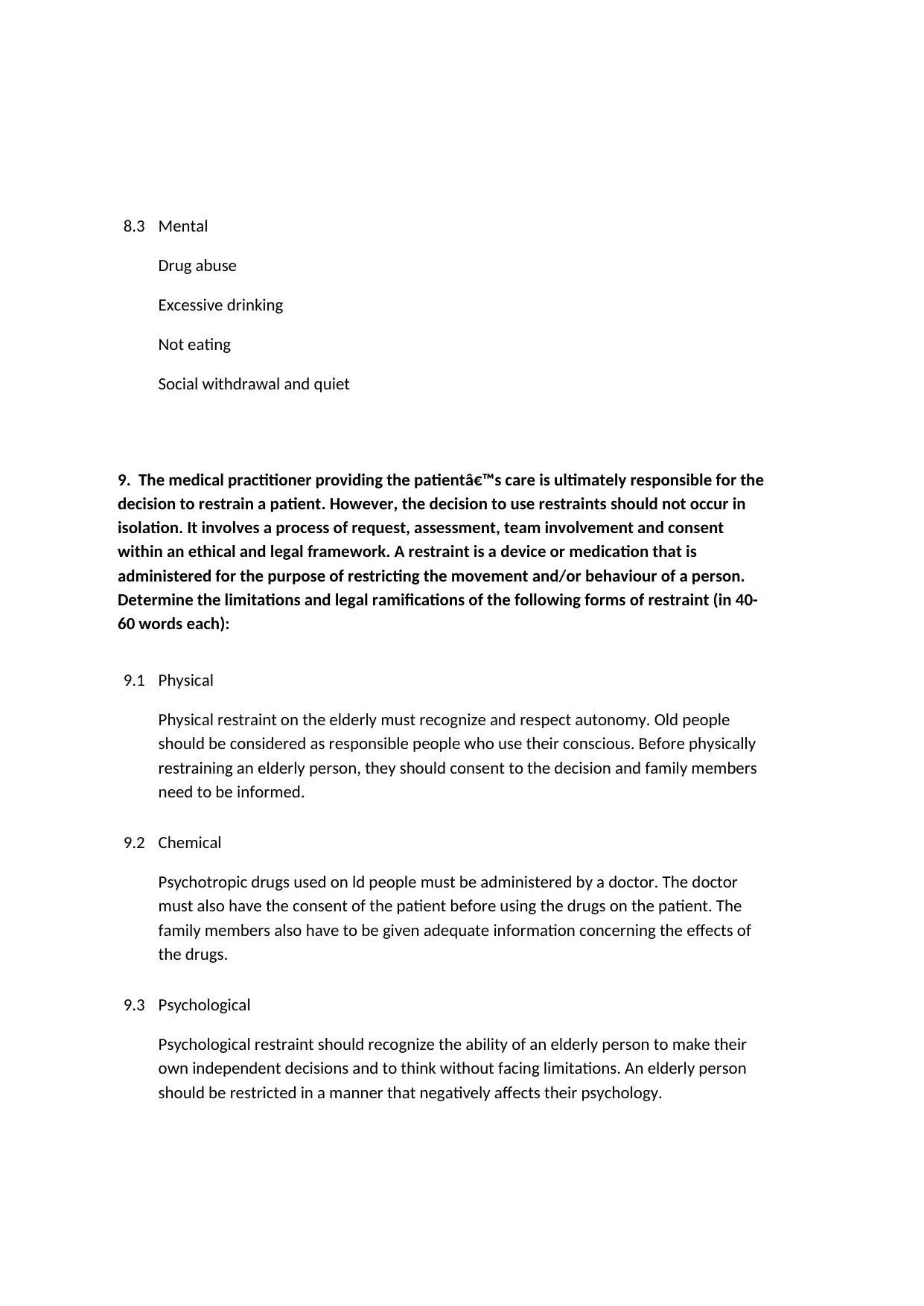
8.3 Mental
Drug abuse
Excessive drinking
Not eating
Social withdrawal and quiet
9. The medical practitioner providing the patient’s care is ultimately responsible for the
decision to restrain a patient. However, the decision to use restraints should not occur in
isolation. It involves a process of request, assessment, team involvement and consent
within an ethical and legal framework. A restraint is a device or medication that is
administered for the purpose of restricting the movement and/or behaviour of a person.
Determine the limitations and legal ramifications of the following forms of restraint (in 40-
60 words each):
9.1 Physical
Physical restraint on the elderly must recognize and respect autonomy. Old people
should be considered as responsible people who use their conscious. Before physically
restraining an elderly person, they should consent to the decision and family members
need to be informed.
9.2 Chemical
Psychotropic drugs used on ld people must be administered by a doctor. The doctor
must also have the consent of the patient before using the drugs on the patient. The
family members also have to be given adequate information concerning the effects of
the drugs.
9.3 Psychological
Psychological restraint should recognize the ability of an elderly person to make their
own independent decisions and to think without facing limitations. An elderly person
should be restricted in a manner that negatively affects their psychology.
Drug abuse
Excessive drinking
Not eating
Social withdrawal and quiet
9. The medical practitioner providing the patient’s care is ultimately responsible for the
decision to restrain a patient. However, the decision to use restraints should not occur in
isolation. It involves a process of request, assessment, team involvement and consent
within an ethical and legal framework. A restraint is a device or medication that is
administered for the purpose of restricting the movement and/or behaviour of a person.
Determine the limitations and legal ramifications of the following forms of restraint (in 40-
60 words each):
9.1 Physical
Physical restraint on the elderly must recognize and respect autonomy. Old people
should be considered as responsible people who use their conscious. Before physically
restraining an elderly person, they should consent to the decision and family members
need to be informed.
9.2 Chemical
Psychotropic drugs used on ld people must be administered by a doctor. The doctor
must also have the consent of the patient before using the drugs on the patient. The
family members also have to be given adequate information concerning the effects of
the drugs.
9.3 Psychological
Psychological restraint should recognize the ability of an elderly person to make their
own independent decisions and to think without facing limitations. An elderly person
should be restricted in a manner that negatively affects their psychology.
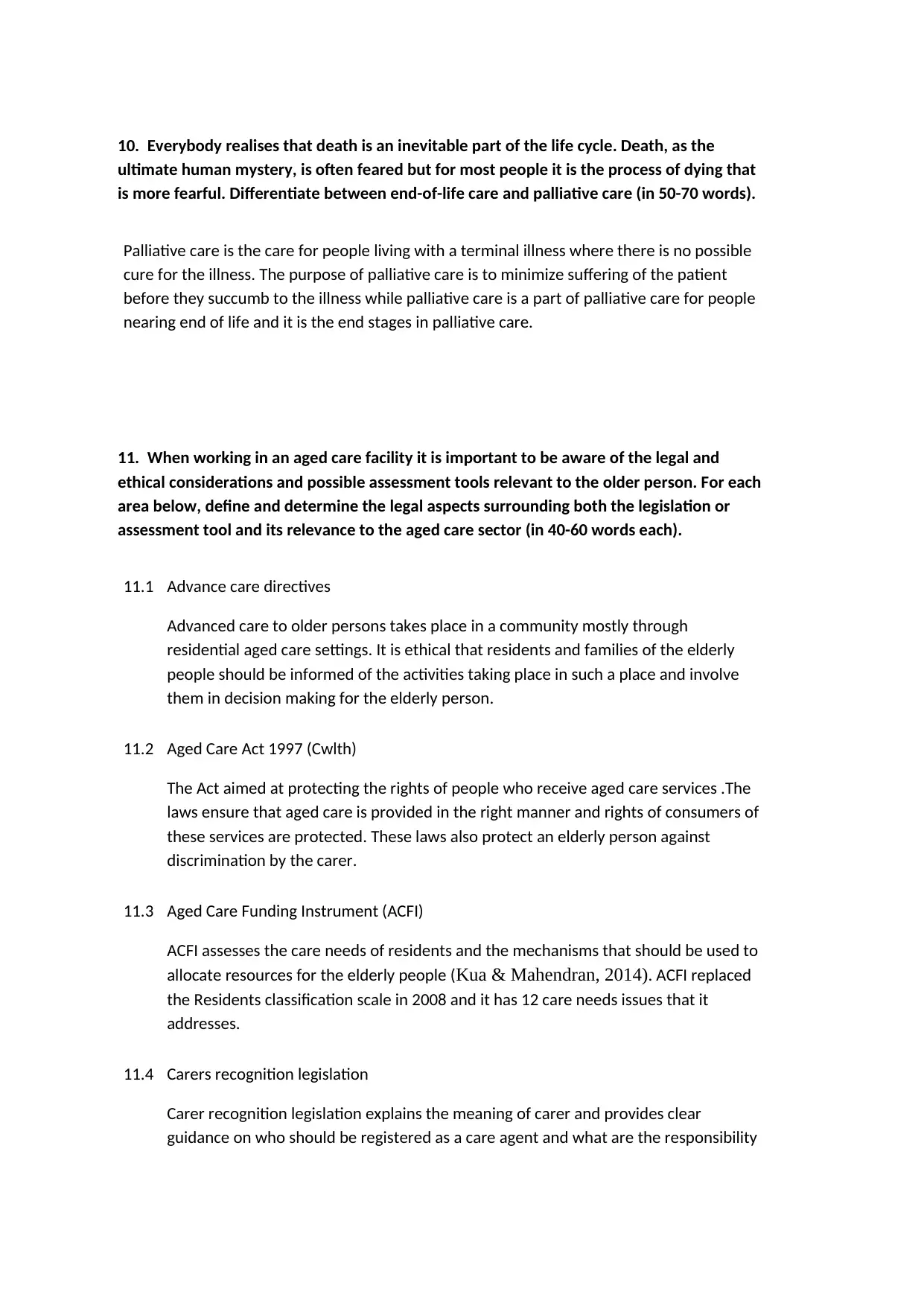
10. Everybody realises that death is an inevitable part of the life cycle. Death, as the
ultimate human mystery, is often feared but for most people it is the process of dying that
is more fearful. Differentiate between end-of-life care and palliative care (in 50-70 words).
Palliative care is the care for people living with a terminal illness where there is no possible
cure for the illness. The purpose of palliative care is to minimize suffering of the patient
before they succumb to the illness while palliative care is a part of palliative care for people
nearing end of life and it is the end stages in palliative care.
11. When working in an aged care facility it is important to be aware of the legal and
ethical considerations and possible assessment tools relevant to the older person. For each
area below, define and determine the legal aspects surrounding both the legislation or
assessment tool and its relevance to the aged care sector (in 40-60 words each).
11.1 Advance care directives
Advanced care to older persons takes place in a community mostly through
residential aged care settings. It is ethical that residents and families of the elderly
people should be informed of the activities taking place in such a place and involve
them in decision making for the elderly person.
11.2 Aged Care Act 1997 (Cwlth)
The Act aimed at protecting the rights of people who receive aged care services .The
laws ensure that aged care is provided in the right manner and rights of consumers of
these services are protected. These laws also protect an elderly person against
discrimination by the carer.
11.3 Aged Care Funding Instrument (ACFI)
ACFI assesses the care needs of residents and the mechanisms that should be used to
allocate resources for the elderly people (Kua & Mahendran, 2014). ACFI replaced
the Residents classification scale in 2008 and it has 12 care needs issues that it
addresses.
11.4 Carers recognition legislation
Carer recognition legislation explains the meaning of carer and provides clear
guidance on who should be registered as a care agent and what are the responsibility
ultimate human mystery, is often feared but for most people it is the process of dying that
is more fearful. Differentiate between end-of-life care and palliative care (in 50-70 words).
Palliative care is the care for people living with a terminal illness where there is no possible
cure for the illness. The purpose of palliative care is to minimize suffering of the patient
before they succumb to the illness while palliative care is a part of palliative care for people
nearing end of life and it is the end stages in palliative care.
11. When working in an aged care facility it is important to be aware of the legal and
ethical considerations and possible assessment tools relevant to the older person. For each
area below, define and determine the legal aspects surrounding both the legislation or
assessment tool and its relevance to the aged care sector (in 40-60 words each).
11.1 Advance care directives
Advanced care to older persons takes place in a community mostly through
residential aged care settings. It is ethical that residents and families of the elderly
people should be informed of the activities taking place in such a place and involve
them in decision making for the elderly person.
11.2 Aged Care Act 1997 (Cwlth)
The Act aimed at protecting the rights of people who receive aged care services .The
laws ensure that aged care is provided in the right manner and rights of consumers of
these services are protected. These laws also protect an elderly person against
discrimination by the carer.
11.3 Aged Care Funding Instrument (ACFI)
ACFI assesses the care needs of residents and the mechanisms that should be used to
allocate resources for the elderly people (Kua & Mahendran, 2014). ACFI replaced
the Residents classification scale in 2008 and it has 12 care needs issues that it
addresses.
11.4 Carers recognition legislation
Carer recognition legislation explains the meaning of carer and provides clear
guidance on who should be registered as a care agent and what are the responsibility
⊘ This is a preview!⊘
Do you want full access?
Subscribe today to unlock all pages.

Trusted by 1+ million students worldwide
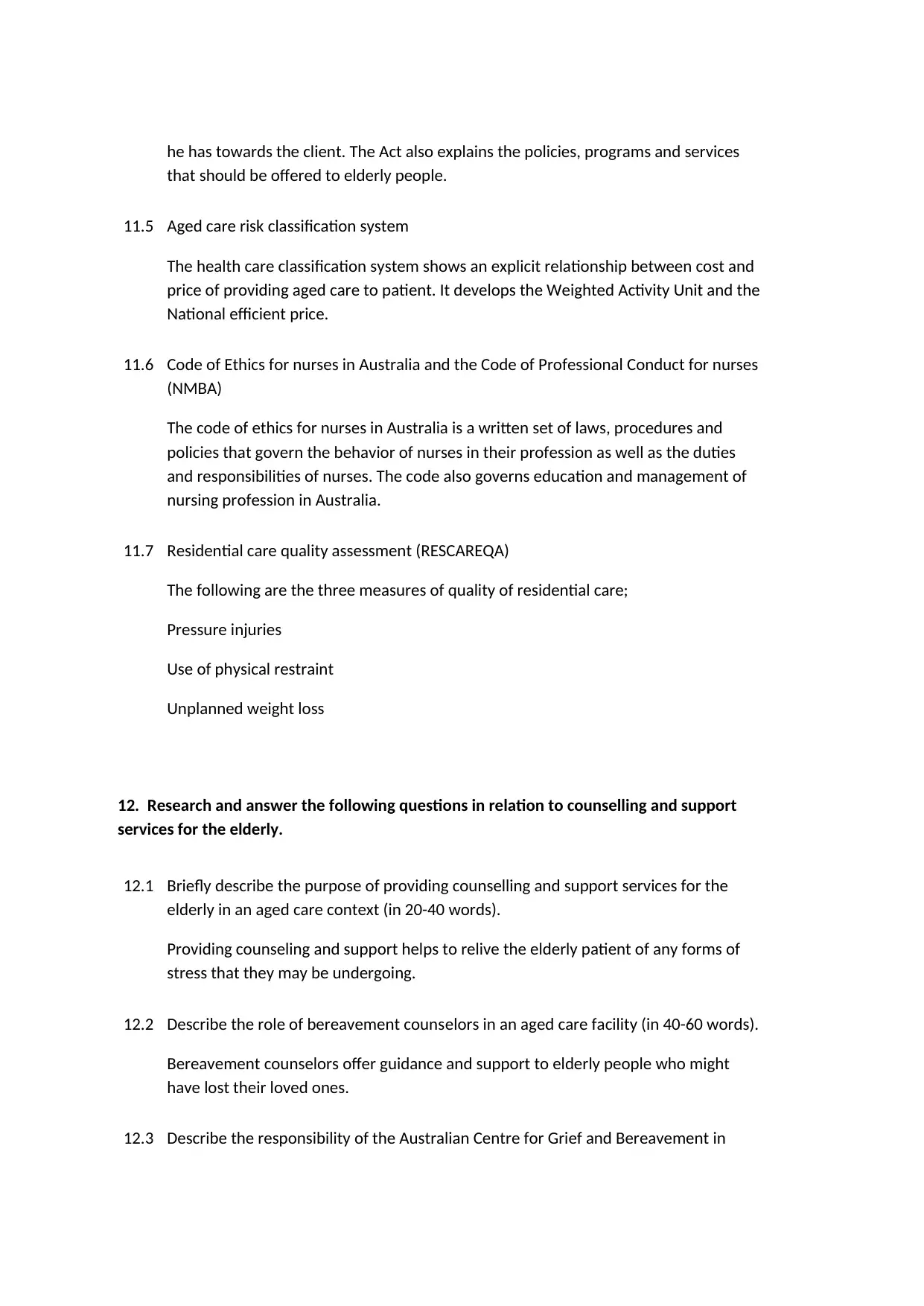
he has towards the client. The Act also explains the policies, programs and services
that should be offered to elderly people.
11.5 Aged care risk classification system
The health care classification system shows an explicit relationship between cost and
price of providing aged care to patient. It develops the Weighted Activity Unit and the
National efficient price.
11.6 Code of Ethics for nurses in Australia and the Code of Professional Conduct for nurses
(NMBA)
The code of ethics for nurses in Australia is a written set of laws, procedures and
policies that govern the behavior of nurses in their profession as well as the duties
and responsibilities of nurses. The code also governs education and management of
nursing profession in Australia.
11.7 Residential care quality assessment (RESCAREQA)
The following are the three measures of quality of residential care;
Pressure injuries
Use of physical restraint
Unplanned weight loss
12. Research and answer the following questions in relation to counselling and support
services for the elderly.
12.1 Briefly describe the purpose of providing counselling and support services for the
elderly in an aged care context (in 20-40 words).
Providing counseling and support helps to relive the elderly patient of any forms of
stress that they may be undergoing.
12.2 Describe the role of bereavement counselors in an aged care facility (in 40-60 words).
Bereavement counselors offer guidance and support to elderly people who might
have lost their loved ones.
12.3 Describe the responsibility of the Australian Centre for Grief and Bereavement in
that should be offered to elderly people.
11.5 Aged care risk classification system
The health care classification system shows an explicit relationship between cost and
price of providing aged care to patient. It develops the Weighted Activity Unit and the
National efficient price.
11.6 Code of Ethics for nurses in Australia and the Code of Professional Conduct for nurses
(NMBA)
The code of ethics for nurses in Australia is a written set of laws, procedures and
policies that govern the behavior of nurses in their profession as well as the duties
and responsibilities of nurses. The code also governs education and management of
nursing profession in Australia.
11.7 Residential care quality assessment (RESCAREQA)
The following are the three measures of quality of residential care;
Pressure injuries
Use of physical restraint
Unplanned weight loss
12. Research and answer the following questions in relation to counselling and support
services for the elderly.
12.1 Briefly describe the purpose of providing counselling and support services for the
elderly in an aged care context (in 20-40 words).
Providing counseling and support helps to relive the elderly patient of any forms of
stress that they may be undergoing.
12.2 Describe the role of bereavement counselors in an aged care facility (in 40-60 words).
Bereavement counselors offer guidance and support to elderly people who might
have lost their loved ones.
12.3 Describe the responsibility of the Australian Centre for Grief and Bereavement in
Paraphrase This Document
Need a fresh take? Get an instant paraphrase of this document with our AI Paraphraser
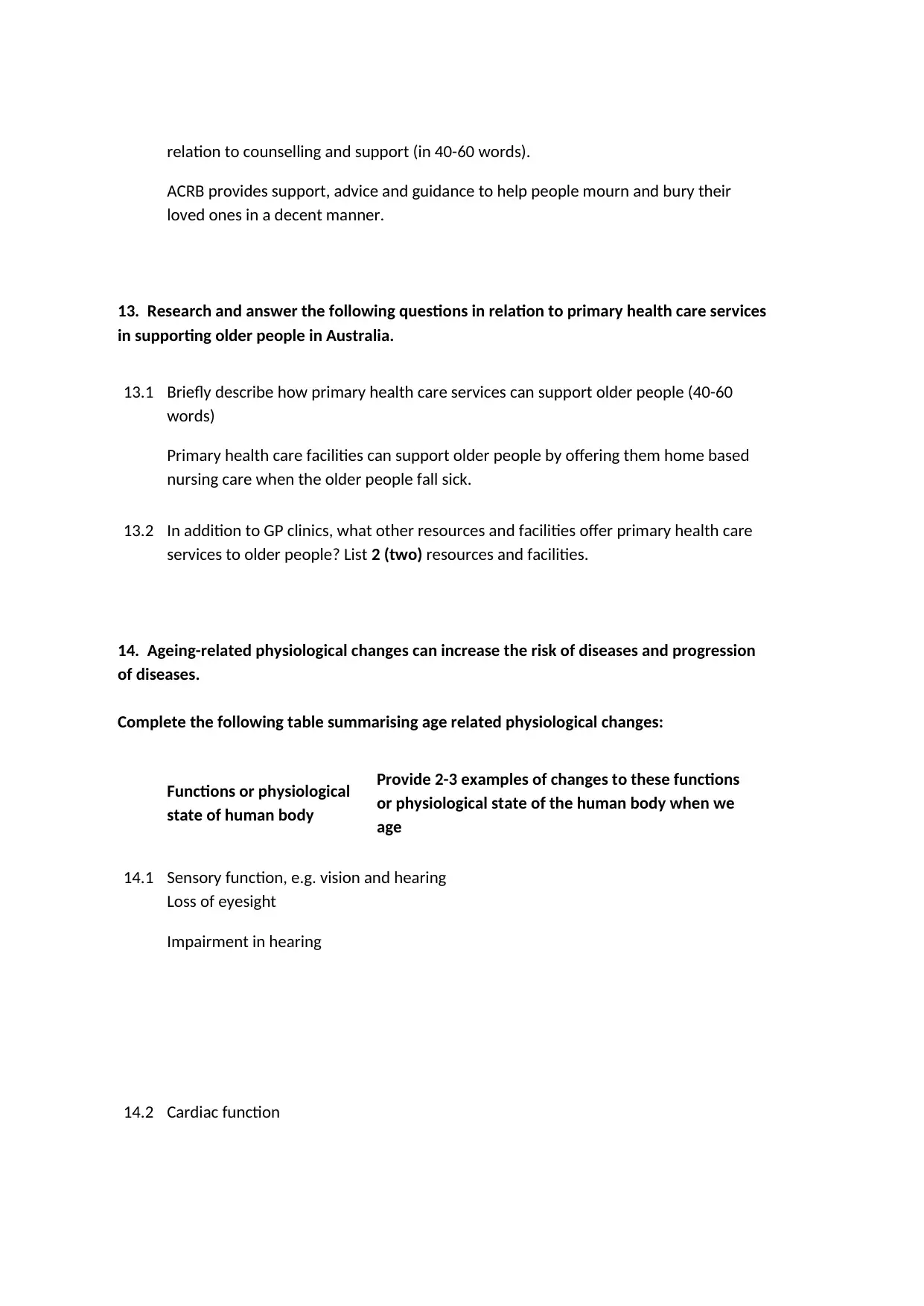
relation to counselling and support (in 40-60 words).
ACRB provides support, advice and guidance to help people mourn and bury their
loved ones in a decent manner.
13. Research and answer the following questions in relation to primary health care services
in supporting older people in Australia.
13.1 Briefly describe how primary health care services can support older people (40-60
words)
Primary health care facilities can support older people by offering them home based
nursing care when the older people fall sick.
13.2 In addition to GP clinics, what other resources and facilities offer primary health care
services to older people? List 2 (two) resources and facilities.
14. Ageing-related physiological changes can increase the risk of diseases and progression
of diseases.
Complete the following table summarising age related physiological changes:
Functions or physiological
state of human body
Provide 2-3 examples of changes to these functions
or physiological state of the human body when we
age
14.1 Sensory function, e.g. vision and hearing
Loss of eyesight
Impairment in hearing
14.2 Cardiac function
ACRB provides support, advice and guidance to help people mourn and bury their
loved ones in a decent manner.
13. Research and answer the following questions in relation to primary health care services
in supporting older people in Australia.
13.1 Briefly describe how primary health care services can support older people (40-60
words)
Primary health care facilities can support older people by offering them home based
nursing care when the older people fall sick.
13.2 In addition to GP clinics, what other resources and facilities offer primary health care
services to older people? List 2 (two) resources and facilities.
14. Ageing-related physiological changes can increase the risk of diseases and progression
of diseases.
Complete the following table summarising age related physiological changes:
Functions or physiological
state of human body
Provide 2-3 examples of changes to these functions
or physiological state of the human body when we
age
14.1 Sensory function, e.g. vision and hearing
Loss of eyesight
Impairment in hearing
14.2 Cardiac function
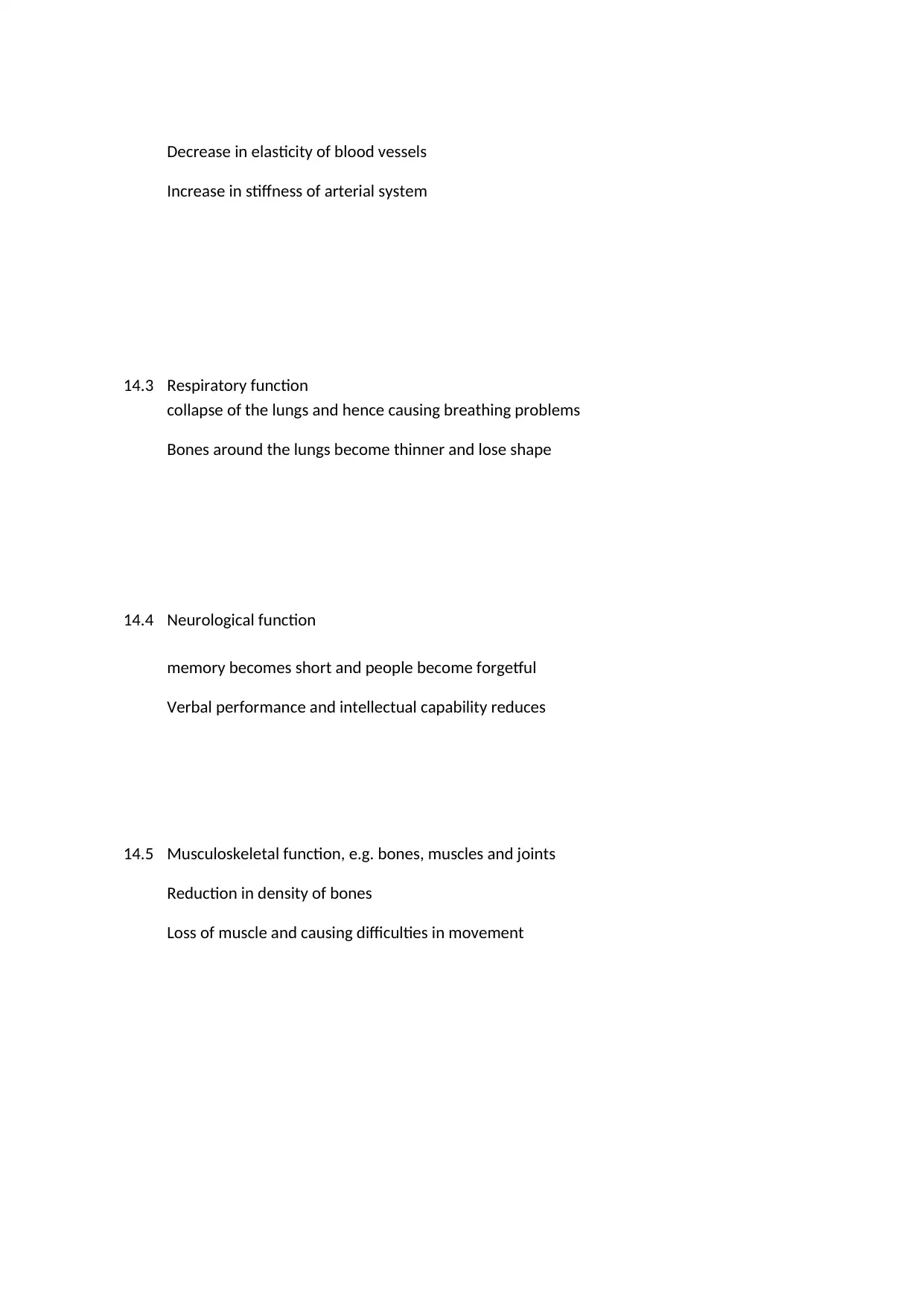
Decrease in elasticity of blood vessels
Increase in stiffness of arterial system
14.3 Respiratory function
collapse of the lungs and hence causing breathing problems
Bones around the lungs become thinner and lose shape
14.4 Neurological function
memory becomes short and people become forgetful
Verbal performance and intellectual capability reduces
14.5 Musculoskeletal function, e.g. bones, muscles and joints
Reduction in density of bones
Loss of muscle and causing difficulties in movement
Increase in stiffness of arterial system
14.3 Respiratory function
collapse of the lungs and hence causing breathing problems
Bones around the lungs become thinner and lose shape
14.4 Neurological function
memory becomes short and people become forgetful
Verbal performance and intellectual capability reduces
14.5 Musculoskeletal function, e.g. bones, muscles and joints
Reduction in density of bones
Loss of muscle and causing difficulties in movement
⊘ This is a preview!⊘
Do you want full access?
Subscribe today to unlock all pages.

Trusted by 1+ million students worldwide
1 out of 16
Related Documents
Your All-in-One AI-Powered Toolkit for Academic Success.
+13062052269
info@desklib.com
Available 24*7 on WhatsApp / Email
![[object Object]](/_next/static/media/star-bottom.7253800d.svg)
Unlock your academic potential
Copyright © 2020–2025 A2Z Services. All Rights Reserved. Developed and managed by ZUCOL.





